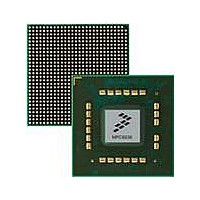MPC8536DS Freescale Semiconductor, MPC8536DS Datasheet - Page 1428

MPC8536DS
Manufacturer Part Number
MPC8536DS
Description
BOARD DEV SYSTEM MPC8536E
Manufacturer
Freescale Semiconductor
Series
PowerQUICC III™r
Type
MPUr
Datasheets
1.MPC8536EBVTAVLA.pdf
(127 pages)
2.MPC8536EBVTAVLA.pdf
(1706 pages)
3.MPC8536DS.pdf
(2 pages)
4.MPC8536DS.pdf
(126 pages)
Specifications of MPC8536DS
Contents
Board, Software and Documentation
Processor Series
MPC85xx
Core
e500
Data Bus Width
32 bit
Maximum Clock Frequency
667 MHz
Operating Supply Voltage
- 0.3 V to + 1.21 V
Maximum Operating Temperature
+ 105 C
Data Ram Size
32 KB
Interface Type
SPI, USB
Program Memory Type
DDR2, DDR3, SDRAM
Core Size
32 Bit
Program Memory Size
544KB
Cpu Speed
1.5GHz
Digital Ic Case Style
BGA
No. Of Pins
783
Supply Voltage Range
0.95V To 1.05V
Rohs Compliant
Yes
For Use With/related Products
MPC8536
Lead Free Status / RoHS Status
Lead free / RoHS Compliant
- MPC8536EBVTAVLA PDF datasheet
- MPC8536EBVTAVLA PDF datasheet #2
- MPC8536DS PDF datasheet #3
- MPC8536DS PDF datasheet #4
- Current page: 1428 of 1706
- Download datasheet (15Mb)
Universal Serial Bus Interfaces
one of the following events occur: The transaction translator responds to a complete-split transaction with
one of the following:
Each time the host controller visits a queue head in this state (once within the Execute Transaction state),
bit-wise ANDs QH[S-mask] with cMicroFrameBit to determine whether to execute a start-split. If the
result is non-zero, then the host controller issues a start-split transaction. If the PID Code field indicates
an IN transaction, the host controller must zero-out the QH[S-bytes] field. After the split-transaction has
been executed, the host controller sets up state in the queue head to track the progress of the complete-split
phase of the split transaction. Specifically, it records the expected frame number into QH[FrameTag] field,
sets C-prog-mask to zero (0x00), and exits this state. Note that the host controller must not adjust the value
of Cerr as a result of completion of a start-split transaction.
21.6.12.2.7 Periodic Interrupt—Do-Complete-Split
This state is entered unconditionally from the Do Start Split state after a start-split transaction is executed
on the bus. Each time the host controller visits a queue head in this state (once within the Execute
Transaction state), it checks to determine whether a complete-split transaction should be executed now.
There are four tests to determine whether a complete-split transaction should be executed.
21-94
•
•
•
•
•
•
•
•
NAK. A NAK response is a propagation of the full- or low-speed endpoint's NAK response.
ACK. An ACK response is a propagation of the full- or low-speed endpoint's ACK response. Only
occurs on an OUT endpoint.
DATA 0/1. Only occurs for INs. Indicates that this is the last of the data from the endpoint for this
split transaction.
ERR. The transaction on the low-/full-speed link below the transaction translator had a failure (for
example, timeout, bad CRC, etc.).
NYET (and Last). The host controller issued the last complete-split and the transaction translator
responded with a NYET handshake. This means that the start-split was not correctly received by
the transaction translator, so it never executed a transaction to the full- or low-speed endpoint, see
Section Periodic Interrupt - Do Complete Split for the definition of 'Last'.
Test A. cMicroFrameBit is bit-wise ANDed with QH[C-mask] field. A non-zero result indicates
that software scheduled a complete-split for this endpoint, during this micro-frame.
Test B. QH[FrameTag] is compared with the current contents of FRINDEX[7–3]. An equal
indicates a match.
Test C. The complete-split progress bit vector is checked to determine whether the previous bit is
set, indicating that the previous complete-split was appropriately executed. An example algorithm
for this test is provided below:
Algorithm Boolean CheckPreviousBit(QH.C-prog-mask, QH.C-mask, cMicroFrameBit)
Begin
-- Return values:
-- TRUE - no error
-- FALSE - error
--
Boolean rvalue = TRUE;
previousBit = cMicroframeBit logical-rotate-right(1)
-- Bit-wise anding previousBit with C-mask indicates
-- whether there was an intent
MPC8536E PowerQUICC III Integrated Processor Reference Manual, Rev. 1
Freescale Semiconductor
Related parts for MPC8536DS
Image
Part Number
Description
Manufacturer
Datasheet
Request
R
Part Number:
Description:
Manufacturer:
Freescale Semiconductor, Inc
Datasheet:
Part Number:
Description:
Manufacturer:
Freescale Semiconductor, Inc
Datasheet:
Part Number:
Description:
Manufacturer:
Freescale Semiconductor, Inc
Datasheet:
Part Number:
Description:
Manufacturer:
Freescale Semiconductor, Inc
Datasheet:
Part Number:
Description:
Manufacturer:
Freescale Semiconductor, Inc
Datasheet:
Part Number:
Description:
Manufacturer:
Freescale Semiconductor, Inc
Datasheet:
Part Number:
Description:
Manufacturer:
Freescale Semiconductor, Inc
Datasheet:
Part Number:
Description:
Manufacturer:
Freescale Semiconductor, Inc
Datasheet:
Part Number:
Description:
Manufacturer:
Freescale Semiconductor, Inc
Datasheet:
Part Number:
Description:
Manufacturer:
Freescale Semiconductor, Inc
Datasheet:
Part Number:
Description:
Manufacturer:
Freescale Semiconductor, Inc
Datasheet:
Part Number:
Description:
Manufacturer:
Freescale Semiconductor, Inc
Datasheet:
Part Number:
Description:
Manufacturer:
Freescale Semiconductor, Inc
Datasheet:
Part Number:
Description:
Manufacturer:
Freescale Semiconductor, Inc
Datasheet:
Part Number:
Description:
Manufacturer:
Freescale Semiconductor, Inc
Datasheet:










